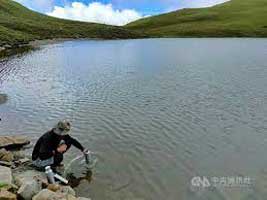
Microplastic contamination has been found in 100 percent of water samples collected from Jiaming Lake
polympart: Taipei, Oct. 31 (CNA) Microplastic contamination has been found in 100 percent of water samples collected from Jiaming Lake in Taitung, the second highest mountain lake in Taiwan and a main source of drinking water for the Formosan sambar deer, a protected species, according to a research report issued Sunday.
Meanwhile, the positive detection rate of microplastics in water samples collected from other sources along the hiking trail to Jiaming Lake, at an elevation of 3,310-m above sea level, was up to 80 percent, the international environmental organization Greenpeace said in a statement when publishing the report.
The Formosan sambar deer, a subspecies of the sambar found in the high mountains, is Taiwan’s largest herbivore, and is listed as a protected species under the Wildlife Conservation Act because it was driven to the verge of extinction by hunting and the destruction of its natural habitat.
With large and medium-sized mammals consuming an average of 30cc per kilogram of body weight per day, given that adult deers weigh about 150 kilograms, the sambar in the Jiaming Lake area could consume 80 microplastic particles per day, according to Greenpeace.
Microplastics are not a specific kind of plastic, but rather any type of plastic fragment that is less than five millimeters in length
Microplastics are small, barely visible pieces of plastic that enter and pollute the environment. They are not a specific kind of plastic, but rather any type of plastic fragment that is less than five millimeters in length.
Microplastics could potentially harm protected animal species
Microplastic particles are found in water bodies and in the terrestrial environment and could potentially harm protected animal species, Greenpeace project director Tang An (唐安) said, adding that more should be done to reduce the use of plastics to better protect endangered animals.
A Greenpeace research team in July collected 15 water samples from sources for the deer and 31 samples from deer excreta along the trail and the Tataka area in Yushan, the highest peak in Taiwan at an altitude of 3,952 meters.It was also found that deer excreta samples collected from Tataka had the highest microplastics positive detection rate at over 30 percent, Greenpeace noted.
This was the first research report released by Greenpeace on the impact of microplastics on native animal species and will be used as a basis for further research on the impact of microplastics on the terrestrial ecosystem, the environmental group said.
source: https://focustaiwan.tw
